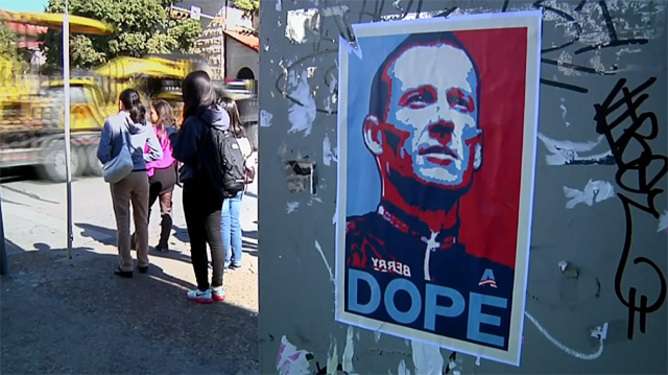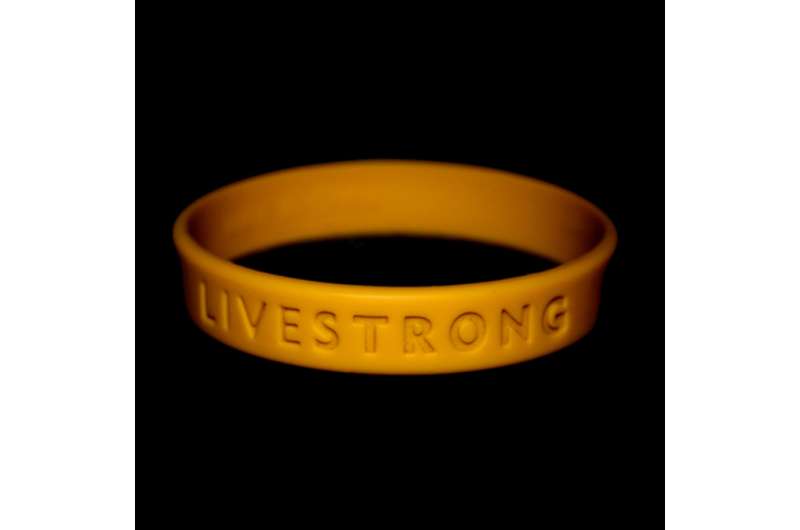Opinion: Has Lance Armstrong's impact in cycling and beyond been a net positive?

Lance Armstrong is in the news again during the Tour de France. He has tweeted about the speculation around current Tour leader Chris Froome, and has been riding along some of the 2015 Tour de France stage routes on a charity ride.
Let me say from the outset that I abhor doping in cycling. My writing on the issue should make that clear. But a friend recently asked me an unexpected question about Lance Armstrong that made me stop and realise there's an aspect about his story that I had never fully contemplated. His question:
"Is it possible that Lance Armstrong's role in popularising cycling has done more for community cardiovascular health than 20 years of cardiovascular medicine?"
Despite my views about doping, this question made me pause to think a bit deeper about what Lance Armstrong's wider impact has been. Beyond the costs of his doping to win those seven tainted Tour de France titles, and the other negative fallout from that, what were the positive effects from Lance Armstrong's cycling career?
No doubt even the mere suggestion of this line of thinking will raise many people's hackles. Nevertheless, I feel it is an interesting question and discussion point, and worthy of some consideration.
A related question of course is, will Lance Armstrong ever be forgiven by the world of cycling? From the support he gets on social media and in other public settings, it seems a great many cycling fans and people generally have already forgiven him.
But will the sport of cycling ever do so?
Given cycling history, Armstrong will probably be forgiven…eventually
If you look to cycling history you'd have to conclude the chances are Armstrong will indeed be forgiven by cycling, and will probably be welcomed back in some way, or lauded as a hero in the future. There is something about the culture of cycling that continues to tolerate and celebrate past cheats and dopers.
Evidence of this can be seen in the long list of past dopers and Tour de France riders who have either tested positive, confessed to doping, missed doping controls, or received sanctions; and yet have been forgiven or celebrated in the sport in some way. Consider the following names, and how they are regarded today: Jacques Ancquetil, Tom Simpson, Eddy Merckx, Laurent Fignon, Phil Anderson, Sean Kelly, Stephen Roche, Paul Kimmage, Stephen Hodge, Laurent Jalabert, Marco Pantani, Neil Stephens, Richard Virenque, Matt White, Stuart O'Grady, Jonathon Vaughters, Christian Vande Velde, David Millar, Erik Zabel, Michael Rasmussen, Alexander Vinokourov, George Hincapie, Alejandro Valverde, Alberto Contador, Ivan Basso, Ryder Hesjedal.
Need I go on?
Regardless of what you might say about the above individual cases, the conditions around certain cyclists being accepted back into the fold are worth thinking about. Why are some people forgiven, but not others? Is it due to timing, personality, or strategy or something else?
The Lance Armstrong case is different in nature and magnitude, sure. The popular view seems to be that he was the worst doper of all time. And he did other distasteful things along the way too.
But, would our assessment of Armstrong be different if we tallied the positives from his time, or applied a cost-benefit type analysis to his career? Even the most ardent critic of Armstrong would have to agree that his impact on cycling and the cancer community was positive and significant in terms of profile raising, motivation and inspiration, and economic returns (through uptake of cycling, sales of bikes and equipment, and fundraising).
Calculating the Armstrong effect
So, what would we say if the analysis showed that Lance Armstrong's net impact in the world, his benefits minus his costs, has been mostly positive? How would we even begin to assess that?

Here's what a simple equation to calculate the 'Lance effect' might look like:
(B1 + B2 + B3 + B4 + B5) – (C1 + C2 + C3 + C4) = net impact
where 'B' measures are the benefits that can be attributed to Lance Armstrong, such as:
B1 = $ raised for cancer researchB2 = $ from LA impact on profile of cycling (e.g. cycling club memberships, bike and equipment sales, international and national race appearances (e.g. 2009 Tour Down Under)B3 = $ earned by all the journalists and authors who have written about LAB4 = $ made from LA by Nike, Oakley, Trek, Anheuser-Busch, other sponsorsB5 = $ saved from reduced mortality and morbidity due to people cycling because of LA
and 'C' measures are the costs attributed to Armstrong, such as:
C1 = $ costs of LA doping (lost income and sponsorship to non-doping riders, pro-teams, other areas of cycling)C2 = $ costs of LA initiated lawsuits against individualsC3 = Decline in LA sponsorship and cancer charity $ post doping admissionC4 = $ costs of lawsuits initiated against LA (e.g. SCA case, Floyd Landis case)
Now, I'm no health economist, mathematician, or advanced statistician. But the above equation does help to make an interesting point. Even without knowing the exact figures to plug into such an equation, I think it is reasonable to assume that the net impact of Lance Armstrong has been positive in dollar terms.
It also seems possible to me that if Armstrong were a drug, an active living, or public health intervention of some type, his effect size would probably be huge. This could be measured say by impact on cycling participation, or related quality adjusted life year (QALY) indicators, or even the health improvements for the cohort who started cycling because of him (i.e. reduced mortality and morbidity costs due to fewer acute health episodes such as cardiovascular events, and reduced chronic health issues like obesity, diabetes, heart disease, mental illness etc).
Of course, these are just hypotheses. I could be wrong. And there's likely to be experts out there that would point to flaws in my basic equation above. I'd certainly welcome a discussion on this, and I'd love to see a health economist take on the challenge of calculating a valid and reliable 'Lance effect'.
Methodological issues aside, as Lance Armstrong continues to make his presence felt, I still think the question of how we are to assess Armstrong's overall impact in cycling and beyond is worth contemplating now. He is not going away.
Should we forget about Armstrong's positive impact?
I appreciate many people won't be able to get past the cheating and other negative and destructive behaviour that Lance Armstrong exhibited during the peak of his Tour de France years.
But what are we to say of all the good Armstrong did for the profile of cycling and cancer research? What judgement do we make if the final ledger shows that the Lance Armstrong effect was mostly positive? What if the Armstrong effect has been the creation of a greater good for a larger number of people that far outweighs the damage done by his doping? Is it possible that cycling, and the field of cancer prevention, is better now because of Armstrong than it otherwise would have been without him?
I raise these questions because of all the other dopers still in the sport of cycling. Because of all the caught dopers still riding, and the confessed dopers still working in cycling.
Few people seem to be worrying too much about their impact on cycling, or the mixed messages and double standards from their continuing presence. If you applied a cost-benefit analysis to these cyclists, the size of their benefit or positive impact on cycling would not be anywhere near that of Lance Armstrong. What should we say about this?
For better or worse, we often consider the positive contributions made by people with 'colourful' pasts and flawed characters when deciding when to punish and forgive.
We discount the punishment given to our most hardened criminals for breaking the law, even in some of the worst crimes. The courts consider mitigating circumstances in determining responsibility and sentences for those deemed guilty. We talk of the ideals of rehabilitation, and wiping the slate clean after the debt to society is repaid when people serve their prison sentences.
We are also often prone to a type of forgiveness and re-assessment of history following the deaths of people who have done good and bad – after which there is a public 'balancing' of their legacy (e.g. the reaction after the recent deaths of Alan Bond, Andrew Chan and Myuran Sukumaran shows this).
Armstrong's presence raises important questions
I am not making a case for Lance Armstrong's forgiveness – Armstrong cheated the sport and cycling fans by doping, and the negative impact of that should not be forgotten, nor diluted by sentiment or time.
But I am asking an important question for cycling: How should we think about Lance Armstrong and his impact upon cycling (and beyond), if we reflect consistently and honestly about how we treat others who have doped and cheated the sport?
Even though many of us may want to forget about Lance Armstrong, and wish he would just go away. His public posts on social media about his career and current Tour riders, and recent appearance on a charity ride at the 2015 Tour de France suggests this is very unlikely.
Despite my strong opposition to doping in cycling, the answer to the question of what Armstrong's net impact has been doesn't look black and white to me. It's not as simple as saying Lance Armstrong is a bad person, so let's move on.
To be honest, I would have no problem at all with deleting Lance Armstrong from the cycling history books. I'd be happy if he was never heard of again in cycling. But I also believe that if we're going to do that, to be consistent we should do the same with all the other dopers and cheats in this sport.
Of course, that's not going to happen any time soon. So, we have no choice really but to reflect deeply and consistently about how we think of the dopers in cycling (all of them), their relative impact, and what is the right and fair thing to do about it.
Source: The Conversation
This story is published courtesy of The Conversation (under Creative Commons-Attribution/No derivatives).![]()





















